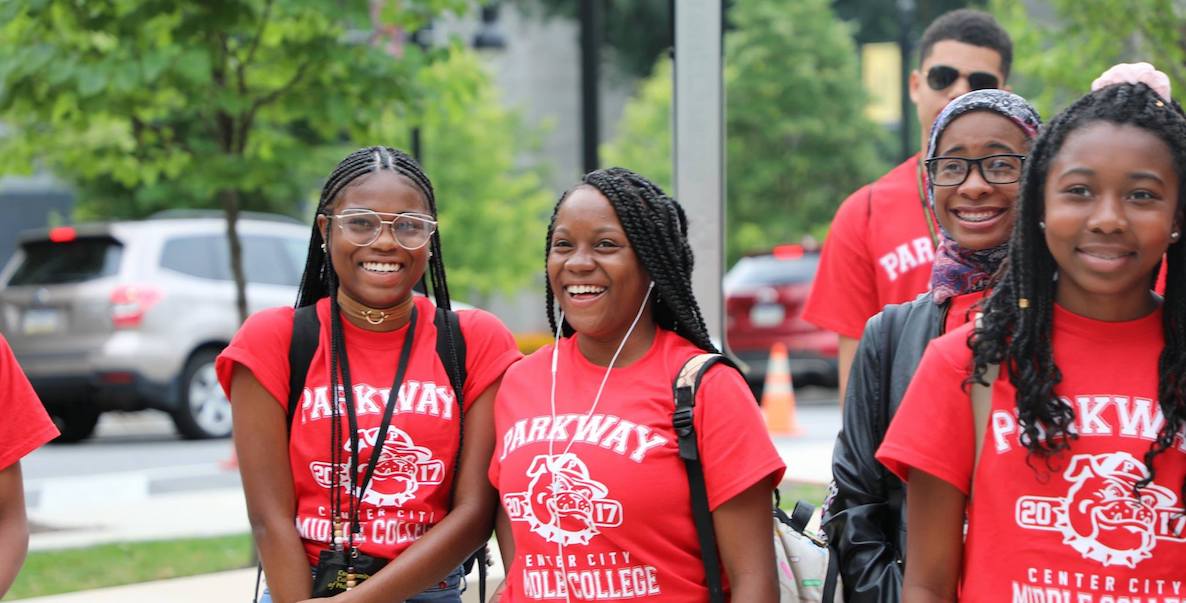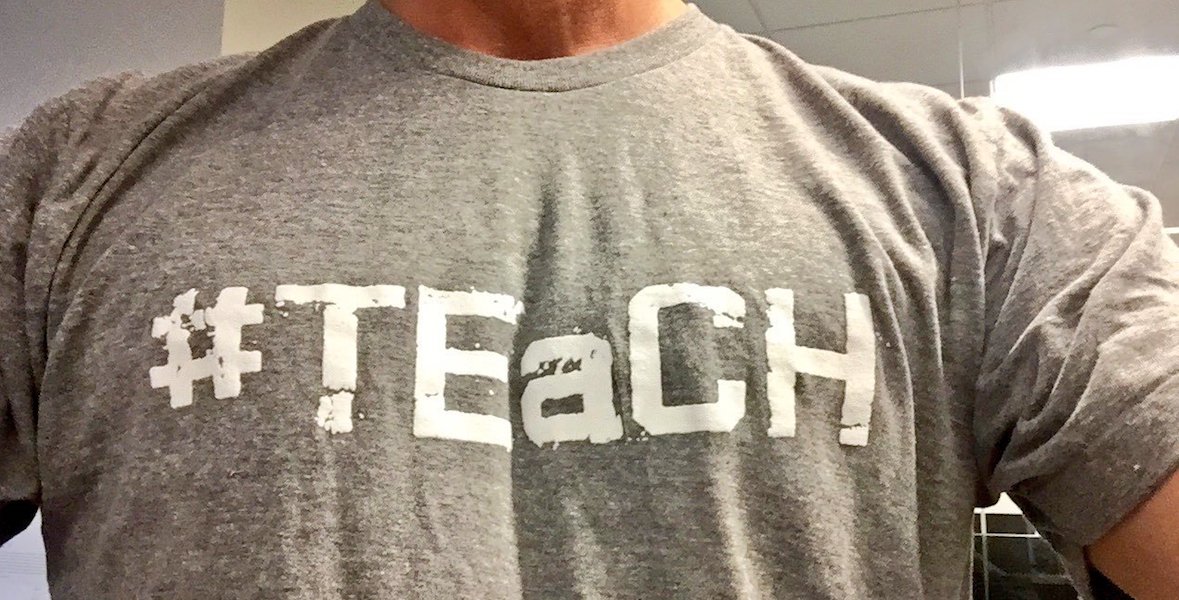The new college students, entering their first year at Community College of Philadelphia in July, were beyond nervous. They were, some of them, terrified. It’s not only that many of them were starting something no one else in their family had managed—college. Or that they were walking through the doors of a college campus, going to a college classroom, and signing up for a college course for the very first time.
Be Part of the Solution
Become a Citizen member.It’s that they were doing it not as high school graduates, or even high school seniors. These kids, the first class of the School District’s new Parkway Center City Middle College, were just out of 8th grade. They were at CCP for a six week “Summer Bridge” program, the first step in the district’s newest experiment in educating students who are ready to go on to and succeed in college.
“These students were so nervous at first,” says Anh Nguyen-Brown, Parkway’s principal, who started at the school in April. “But by the end of Summer Bridge, they were confident scholars. They knew the campus; they had the college experience. They were ready.”
The six week summer program, during which the 120 incoming Parkway freshman took one of seven CCP classes, was a microcosm of what is a pretty ambitious—and necessary—undertaking in a district where college graduation rates are among the lowest in the country. Students at the newly-christened Parkway Center City Middle College (previously Parkway Center City High School), will graduate in four years with both a high school diploma and an associates degree from CCP.
![]()
Along the way, they will have taken more than two full years of college courses—for free—with an eye to transferring those credits to a four year school of their choice. And, like with the summer program, they will have already experienced the growing pains of starting college—taking remediation courses that cost money but don’t go towards a degree; learning to self-advocate and navigate different professors; getting to and from classes on a daunting campus—that can be the difference between sticking it out and dropping out. This is especially true of the population Parkway has targeted for admission: First generation college students.
“This is a very particular slice of the public school population,” says Nguyen-Brown. “Some of our scholars already said they wanted to go to college, but didn’t know a means to be able to go to college. These are the students who often don’t make it through. I call it Stop the Bleeding.”
Parkway is a small special admit high school—classes have around 100 students each—just north of Center City, a few blocks from CCP. To qualify, students must have all As and Bs (with no more than one C), as well as good marks for behavior and attendance, and a desire to go to college. This first year of the college program, Parkway has 120 9th graders taking one class each at CCP; the rest they take in the high school. By 11th and 12th grade, all of the classes will be at CCP, college courses, taught by college professors, and mixed in with other college students. (The classes are chosen to fulfill both Pennsylvania high school and associates degree requirements.) With extra coursework, they can also receive a certificate in computer programming and software development, or entrepreneurship.
“We know from rigorous research that dual enrollment has positive effects on going to college, g.p.a., persistence and college graduation,” says John Fink, research associate at Columbia University’s Community College Research Center.
Students will return to their high school only for supports—tutoring, writing, social services, college counseling. CCP also has a liaison at Parkway to help students with their rosters and expectations. The intensive supports are part of the middle college model, and the only way to make it work; as Nguyen-Brown points out, these are high school kids, not college-ready. It’s a focused approach for a relatively few students, and it has a price: The District estimates a $3 million cost per year to run Parkway, slightly more per student than a regular District school, but less than a turnaround school. “It’s indicative of our commitment to have options across the spectrum,” says Spokesman Lee Whack. “This is an investment we’re making.”
If successful, Parkway could solve several problems. It could make a college degree easier to attain for its graduates, something with generational effects on families and communities. It could also help CCP, whose president Donald Generals is overseeing an extensive redesign to ensure access to more students, and classes that align with four-year colleges or with a well-paying job. He also has another goal: Increasing CCP’s graduation rate, which hovered around 18 percent in a 2015 Pew study—in part because students were not ready for college.
That a program like Parkway is needed says something about the state of our high schools. Remedial classes should not be the norm at CCP; the norm in any high school should be graduating students who are prepared for their world, whether that means college or a job. But the sad truth is, we have spent decades poorly preparing young people for life beyond high school.
Around 65 percent of Philadelphia students graduate high school, a number that is on the rise. A 2015 study by Drexel University professor Paul Harrington that followed 2007 high school graduates for six years found that 40 percent of them enrolled in a two-year college; but only 15 percent of those eventually got a degree. In total, just 21 percent of high school graduates—fewer than 2,000 students—attained a college degree, or were working towards it after six years.
Those are terrible numbers, given the world we live in today, where increasingly, college degrees are the equivalent of what high school diplomas used to be. Harrington says people with some sort of post-high school certification earn 9 percent more than those with just a high school degree; an associates degree brings in 22 percent more; and a bachelors 45 percent more. That requires not only starting school, but finishing; stopping in the middle is worse than not starting at all, given the exorbitant cost of a college education.
![]()
Parkway is one of 60 accredited early middle colleges across the country, a network with a history of improving those graduation numbers. And it is a more formal manifestation of a growing trend among high schools to offer dual enrollment courses for their students, as a way to give them a head start on their higher education. That success depends, in large part, on how prepared students are for college, and how well their classes transfer to a four-year school—the focus of what is happening at Parkway and CCP.
“We know from rigorous research that dual enrollment has positive effects on going to college, g.p.a., persistence and college graduation,” says John Fink, research associate at Columbia University’s Community College Research Center, who recently co-authored the paper, What Happens to Students Who Take Community College “Dual Enrollment” Courses in High School? “The reason is because they’ve already been there. You don’t have all these barriers that those who haven’t been on college campus before have. And it saves money.”
![]() Nguyen-Brown arrived at Parkway in April, after several years spent turning around South Philly’s Nebinger Elementary School. Herself an English Language Learner, Nguyen-Brown understands the struggles of public school—but is also a firm believer in urban education, and what it can offer to every child. She calls her students “scholars,” and is already impressed by their hard work and their dedication. While Philly schools were closed on Rosh Hashanah, Nguyen-Brown says, CCP was still open and Parkway students were expected to show up for their class. Of the 62 students currently in class at CCP, 61 showed up—on their own, without teachers to escort them. (The sole absentee was in Washington, D.C. for an event.)
Nguyen-Brown arrived at Parkway in April, after several years spent turning around South Philly’s Nebinger Elementary School. Herself an English Language Learner, Nguyen-Brown understands the struggles of public school—but is also a firm believer in urban education, and what it can offer to every child. She calls her students “scholars,” and is already impressed by their hard work and their dedication. While Philly schools were closed on Rosh Hashanah, Nguyen-Brown says, CCP was still open and Parkway students were expected to show up for their class. Of the 62 students currently in class at CCP, 61 showed up—on their own, without teachers to escort them. (The sole absentee was in Washington, D.C. for an event.)
“Our kids are serious,” Nguyen-Brown notes.
Nguyen-Brown says the hardest part of the transition so far has been accommodating upperclass students who helped rename the school, but won’t get a CCP degree when they leave. “Kids are so honest,” she says, “and that’s what I love. They said, ‘What do we get?’” Nguyen-Brown arranged for those students, too, to take some courses at CCP. She says 300 10th to 12th graders will take classes at the college this year.
“This is a very particular slice of the public school population,” says Nguyen-Brown. “Some of our scholars already said they wanted to go to college, but didn’t know a means to be able to go to college. These are the students who often don’t make it through. I call it Stop the Bleeding.”
The real test for Parkway will come in six years, when the current 9th graders will be scheduled to graduate from college with their bachelors degrees—after only two years at a four-year college, and only two years of debt. But Nguyen-Brown is looking ahead to a date slightly nearer, in June 2021, when her first class of middle college scholars walk the stage in two different graduation ceremonies—one at Parkway and one at CCP.
“That will be a wonderful day,” she says.
Header Photo: School District of Philadelphia



